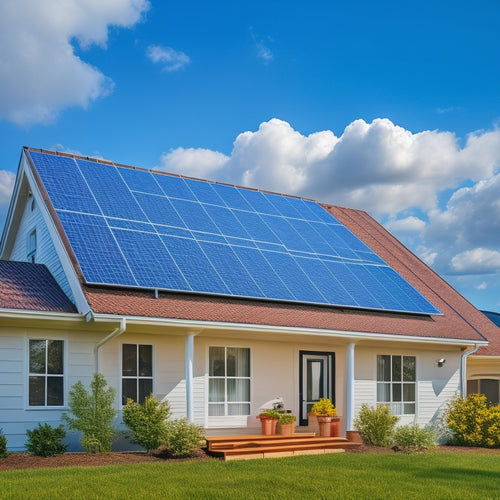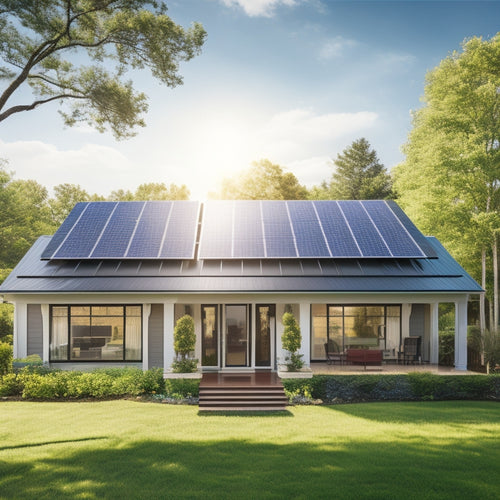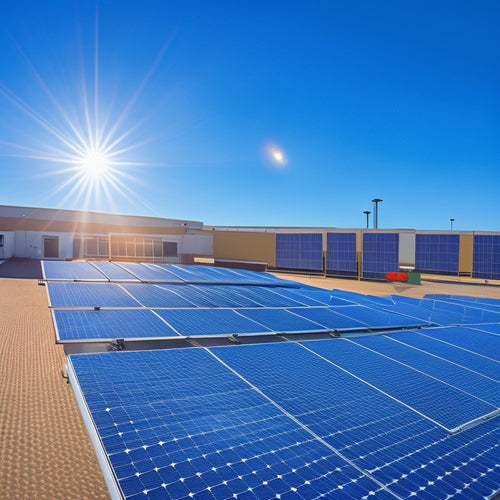
Top Solar Panel Storage Options for Off-Grid Living
Share
For off-grid living, your top solar panel storage options include lithium-ion and lead-acid batteries. Lithium-ion batteries outperform with higher energy density, longer lifespans, and lower maintenance needs, making them ideal for space-limited setups. In contrast, lead-acid batteries are more affordable but require regular upkeep and have shorter cycle lives. Consider your energy needs and budget while evaluating environmental impact as well. You'll want a battery management system to optimize charging and prolong lifespan. Choosing the right inverter is also critical for system compatibility. Uncover the subtleties of these choices to make the best decision for your solar setup.
At a Glance
- Lithium-ion batteries provide high energy density, longer cycle life, and lower maintenance, making them ideal for off-grid living.
- Lead-acid batteries are more affordable upfront but have shorter lifespans and require regular maintenance.
- Saltwater batteries are a less toxic and environmentally friendly option for energy storage.
- An Energy Management System (EMS) enables real-time monitoring and optimization of energy production and usage for enhanced efficiency.
- Proper inverter selection is crucial to ensure compatibility with battery types and maximize system performance.
Efficiency in Energy Storage
When evaluating efficiency in energy storage for your off-grid system, understanding the differences between battery types is essential.
Lithium-ion batteries are known for their high energy density and long lifespan, making them an excellent choice for solar energy storage.
lithium battery technology provides significant advantages over traditional options, allowing for better performance and reduced maintenance costs.
Lead-acid and other variations each offer unique performance metrics that can impact your energy management systems.
Battery Types Comparison
Choosing the right battery type is essential for maximizing energy storage efficiency in off-grid solar systems. When considering options, you'll typically encounter lead-acid and lithium-ion batteries.
Lead-acid batteries are more affordable upfront but come with shorter lifespans and lower energy density, limiting their off-grid scalability. They also require regular maintenance and have a slower discharge rate.
On the other hand, lithium-ion batteries offer greater efficiency and longevity, making them the preferred choice for many off-grid enthusiasts. Their higher energy density allows for better solar panel integration, enabling you to store more energy in a compact space.
Additionally, lithium-ion batteries have a longer cycle life and can withstand deeper discharges, which translates to fewer replacements over time.
When evaluating battery types, consider your energy needs and how much flexibility you want from your system. If you prioritize efficiency and long-term savings, lithium-ion may be worth the higher initial investment.
However, if budget constraints are your primary concern, lead-acid batteries can still serve your off-grid lifestyle, albeit with some trade-offs. Balancing these factors will help you achieve the freedom you seek in your energy independence expedition.
Energy Management Systems
Implementing an effective Energy Management System (EMS) is essential for optimizing energy storage and usage in off-grid solar setups. An EMS allows you to monitor, control, and allocate your energy resources efficiently. This system enhances your independence by maximizing the benefits of renewable energy incentives and facilitating smart grid integration.
Here's a quick overview of key EMS features:
| Feature | Description |
|---|---|
| Real-time Monitoring | Tracks energy production and usage |
| Load Management | Prioritizes essential appliances |
| Battery Management | Optimizes charging and discharging |
| Data Analytics | Provides understanding for better decisions |
Cost Savings Over Time
When you invest in solar panel storage, you greatly reduce your energy bills over time.
This long-term investment not only pays off through savings but also enhances your energy independence.
By utilizing renewable solutions, you can further lower your carbon footprint while enjoying the benefits of reliable energy storage.
Reduced Energy Bills
As you invest in solar panel storage solutions for off-grid living, you'll likely notice a significant reduction in your energy bills over time. By utilizing solar energy, you can minimize reliance on traditional electricity sources, translating into lower monthly expenses. This change not only enhances your energy independence but also aligns with the growing trend of self-sufficiency in energy consumption.
Utilizing solar incentives can further amplify your savings. Many governments and organizations offer tax credits, rebates, and grants for solar panel installations. These financial benefits can offset initial costs, allowing you to recoup your investment faster.
As your system generates free energy, your savings will accumulate, and you'll experience a direct impact on your cash flow.
With efficient battery storage, you can store excess energy produced during peak sunlight hours for later use. This capability means you won't need to purchase energy during high-demand hours, which often come with increased rates.
Over time, these savings contribute to a more sustainable lifestyle, enabling you to enjoy true energy independence while decreasing your overall utility costs. Shifting to solar isn't just a choice; it's a pathway to financial freedom.
Long-Term Investment Benefits
Investing in solar panel storage not only enhances energy independence but also provides considerable long-term financial benefits. By utilizing solar energy and storing it for later use, you can markedly reduce reliance on traditional power sources, leading to lower energy bills over time. With rising electricity prices, this cost savings is priceless.
Moreover, many regions offer financial incentives for installing solar systems, such as tax credits and rebates. These incentives can offset the initial investment, making solar panel storage even more appealing.
The decreased reliance on fossil fuels not only improves your personal finances but also positively affects the environment. By choosing renewable energy, you contribute to a reduction in greenhouse gas emissions, amplifying your impact on climate change.
As you consider your long-term investment, think about the potential resale value of your property. Homes equipped with solar panel storage systems are increasingly attractive to buyers, further enhancing your investment.
Ultimately, the combination of financial incentives, ongoing cost savings, and positive environmental impact positions solar panel storage as a smart choice for those seeking freedom from traditional energy constraints. It's an investment that pays dividends for years to come.
Battery Lifespan and Durability
When choosing batteries for off-grid living, cycle life is a critical factor that directly affects their longevity.
Additionally, understanding the different battery chemistries, such as lithium-ion and lead-acid, can greatly influence performance and lifespan.
You'll also need to take into account how temperature fluctuations can impact performance, as extreme conditions can shorten lifespan and reduce efficiency.
Understanding deep cycle batteries will help you select a battery that meets your energy needs reliably over time.
Cycle Life Considerations
Understanding cycle life considerations is vital for anyone investing in battery storage for off-grid living. The cycle life of a battery refers to the number of complete charge and discharge cycles it can undergo before its capacity markedly degrades. For your solar setup, this means selecting a battery type that aligns with your energy demands and usage patterns.
Lithium-ion batteries typically offer a longer cycle life, often exceeding 2,000 cycles, compared to lead-acid batteries, which may only provide around 500. This difference can greatly influence your long-term investment, especially if you're seeking autonomy from the grid.
Regular battery maintenance plays an important role in maximizing cycle life; keeping terminals clean and checking electrolyte levels can prevent premature degradation.
Moreover, understanding your solar cycle—how often you charge and discharge your batteries—will help you optimize performance and lifespan. If you consistently drain your batteries to low levels, you might shorten their life greatly.
Temperature Impact on Performance
Temperature plays an important role in the performance and longevity of battery systems used for off-grid solar setups. You need to be aware that extreme temperature variations can lead to performance degradation, greatly impacting your energy independence.
Batteries typically operate best within a specific temperature range, often between 20°C to 25°C (68°F to 77°F). When temperatures drop below or rise above this ideal range, you may experience reduced efficiency and shorter cycle life.
Cold temperatures can slow down chemical reactions within the battery, leading to lower capacity and voltage. Conversely, high temperatures can accelerate wear and tear, leading to overheating and potential thermal runaway. This not only diminishes performance but also risks your safety and investment.
To mitigate these effects, consider implementing temperature control measures for your battery storage. Insulation, ventilation, and strategic placement can help maintain a stable environment.
Selecting Based on System Compatibility
When selecting storage options for your off-grid solar system, it's essential to take into account the compatibility of different battery types with your setup.
Each battery type, whether lithium-ion or lead-acid, has unique characteristics that can affect performance and efficiency. For instance, lithium-ion batteries offer high energy density and longer cycle life, making them ideal for small-scale installations, while lead-acid batteries are more affordable and better suited for larger setups.
Additionally, verify your inverter is compatible with your chosen battery to optimize energy conversion and usage. Proper integration of battery management systems can also enhance the overall efficiency of your energy system.
Battery Types Overview
Choosing the right battery type for your off-grid solar system is essential for optimizing energy storage and ensuring compatibility with your setup.
When evaluating battery options, consider lithium-ion, lead-acid, and saltwater batteries. Lithium-ion batteries are popular for their high energy density, longer lifespan, and lower maintenance requirements. However, their initial cost can be higher.
Lead-acid batteries, including flooded and sealed variants, are more affordable but require regular maintenance and have a shorter cycle life. They also present environmental concerns, particularly if not recycled properly.
Saltwater batteries are an emerging option, offering a more environmentally friendly alternative with less toxic materials. While they're still less common, they may provide a viable solution for your off-grid needs.
To enhance your system's performance, remember these battery maintenance tips: regularly check fluid levels for lead-acid batteries, monitor temperatures, and avoid deep discharges.
This proactive approach not only extends battery life but also reduces your overall environmental impact. By understanding these battery types and their compatibility with your solar setup, you can make an informed choice that aligns with your off-grid lifestyle and energy independence goals.
Inverter Compatibility Considerations
Inverter compatibility is fundamental for guaranteeing your off-grid solar system operates efficiently and reliably. When selecting an inverter, you'll need to take into account the inverter types available—such as pure sine wave, modified sine wave, and grid-tie inverters. Each type serves different applications, so it's essential to match the inverter to your specific needs.
Next, assess the power rating of your inverter. The power rating indicates how much load your inverter can handle, measured in watts. You'll want to verify that the inverter's capacity exceeds the total wattage of your devices, particularly those with high starting loads, like refrigerators or pumps.
Moreover, check the voltage compatibility between your inverter and battery bank. Using the wrong voltage can lead to inefficiencies or even damage your equipment.
Lastly, evaluate the efficiency rating of the inverter. Higher efficiency means less energy lost during conversion, which is critical for maximizing your off-grid system's performance.
Higher Energy Density Options
When considering higher energy density options for off-grid living, lithium-ion batteries stand out due to their compact size and efficiency.
These batteries provide a significant amount of energy storage relative to their weight, making them ideal for limited space applications.
Understanding their advantages and limitations can help you make informed decisions for your solar panel system.
Lithium-Ion Batteries
Lithium-ion batteries stand out as a leading choice for off-grid living, thanks to their higher energy density and efficiency. With lithium advantages, these batteries can store more energy in a smaller footprint compared to traditional lead-acid alternatives. This means you'll have more usable power without sacrificing space, essential for your off-grid setup.
One of the notable safety features of lithium-ion technology is its built-in battery management systems (BMS). These systems monitor temperature, voltage, and current, ensuring peak performance and protecting against overcharging or short-circuiting. This level of safety allows you to enjoy the freedom of off-grid living with peace of mind.
Additionally, lithium-ion batteries have a longer lifespan, often lasting up to 10 years or more, which translates into lower replacement costs and less hassle over time.
Their lightweight build and rapid charging capabilities further enhance their appeal, making them ideal for portable applications or limited space environments.
Frequently Asked Questions
What Are the Environmental Impacts of Solar Battery Production?
Solar battery production impacts the environment through lithium mining, which depletes natural resources and disrupts ecosystems. Additionally, improper battery disposal can lead to toxic waste, affecting soil and water quality, and harming wildlife.
How Do Weather Conditions Affect Solar Panel Storage Performance?
You'd think sunny weather enhances solar efficiency, but extreme heat can actually shorten battery lifespan. Cold temperatures might lower performance too. Balancing these conditions is key to maximizing your solar panel storage's effectiveness and durability.
Can Solar Batteries Be Recycled After Their Lifespan?
Yes, you can recycle solar batteries after their lifespan. Effective lifespan management guarantees you maximize their utility, while solar battery recycling helps recover precious materials, reducing waste and promoting sustainability in your energy independence expedition.
Are There Government Incentives for Solar Battery Installation?
You might be surprised to learn that there are numerous incentive programs available. These include tax credits, utility rebates, and state grants, all designed to encourage solar battery installation and help you achieve energy independence.
How Do I Maintain My Solar Storage System?
To maintain your solar storage system, regularly check battery maintenance, ensuring connections are tight and corrosion-free. Monitor charging cycles, avoiding deep discharges, to maximize lifespan and efficiency, allowing you to sustain your freedom off-grid.
Explore More
In choosing the right solar panel storage for off-grid living, it's essential to weigh efficiency, cost, and compatibility. You might worry about upfront costs, but remember, investing in quality storage pays off in long-term savings and reliability. By selecting a durable battery with high energy density, you guarantee your system meets your needs without frequent replacements. Don't compromise on your energy independence—evaluate these options and make a choice that strengthens your off-grid lifestyle effectively.
Related Posts
-

Cost of Solar Panel Installation
You can expect to pay between $15,000 and $30,000 or more for a typical solar panel installation, depending on the sy...
-

Home Solar Installation Cost
You're considering installing solar panels on your home, and the upfront cost is likely the biggest hurdle standing i...
-

Essential Solar Panel Mounts for Commercial Properties
When it comes to essential solar panel mounts for your commercial property, durability and wind resistance are key fa...


